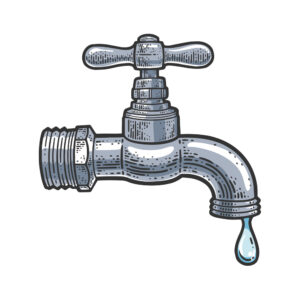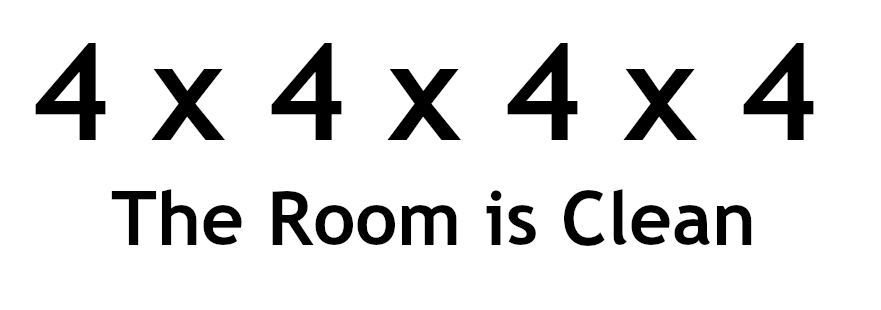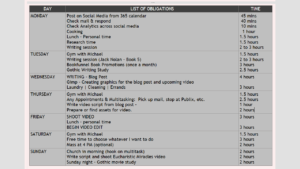Although I'm in retirement now, I wrote the first six of my fiction books while self employed full time. So I know the following strategies work.
Look for the obvious ways you're losing time. Are you sleeping too late and not getting an early enough start? Are you getting lost in social media or talking too long on personal phone calls? We tend to do this kind of thing when we're not in a time-management frame of mind. We assume we have all the time in the world. First look for obvious wasted time. With two ounces of discipline and a tighter but realistic schedule, you can reclaim all wasted time and direct it to your actual goals.
Once you have made the list of obligations and the realistic time frames to complete them, you can more easily juggle a calendar to make time for everything. It's easier to swap out a 2 hour time-frame than a four-hour time frame.
Once you have found all the time leaks and fixed those, now it's time to look at the ways in which we can more efficiently use our time. Most of us develop the bad habit of keeping a mental list of the things we need to accomplish. Then we move from one thing to another based on what we think we should do now or next. This leads to squandering both time and energy.
By looking at all of your weekly or monthly obligations from above, you can be much more efficient with your time. It's possible to categorize tasks and assignments in order to get them done together. With a little foresight, multi-tasking happens naturally. I'll give some examples below.
If you need to pick up mail at a post office or a central location, add that small errand onto the grocery haul. I'm sure you are getting the idea that by grouping errands done with the car together, multi-tasking allows you to clear them all away on one trip. This saves both time, energy -- and gas. This is another huge time savings that can be put towards making time to write or do whatever else you want to do.
I always have a cellphone and ear buds with me. Any time I have to wait, no matter where it is, I watch marketing or writing videos to improve my skills. This is a strategy to squeeze every available minute in a day and make it work for you.
Multi-Task Example 3: Get any Saturday chores out of the way by doing the chores one bite at a time during the week. Washing a floor takes about ten minutes. Dusting one room? Fifteen minutes -- depending upon how many dust-collectors you have displayed! You can get up twenty minutes earlier in the mornings to make time for one housekeeping or bookkeeping chore to clear a full Saturday.
 At the end of your day, when you're ready to sit back and relax, put in a load of laundry first. Set an alarm to put it into the dryer. Be sure to transfer it to the dryer and then you're done. If you have enough energy to fold and hang the clothing when done, great. Otherwise, the folding can go on to tomorrow's list of things to do. Just tumble dry the clothes for five minutes before folding. You have just found two more hours to write.
At the end of your day, when you're ready to sit back and relax, put in a load of laundry first. Set an alarm to put it into the dryer. Be sure to transfer it to the dryer and then you're done. If you have enough energy to fold and hang the clothing when done, great. Otherwise, the folding can go on to tomorrow's list of things to do. Just tumble dry the clothes for five minutes before folding. You have just found two more hours to write.
Reduce All House Cleaning Down to Bite-Sized Pieces: Many people save all the cleaning for Saturday or Sunday. By doing mini-cleanings, as I've described above, you won't need a cleaning day. I haven't set aside a full day to clean in years. My cleaning is all done in little bite-sized pieces and my house is always neat.
The Kitchen: To sweep up the kitchen floor and do a quick mop -- that takes about 10 minutes. Do this ten minutes before going to bed.
Pick up the living room: If your living room is a mess -- and if you have kids it probably will be -- do the following: Before sitting down for the night or before leaving for work in the morning, put four things away. Then put another four things away. By about the fourth run of putting four things away, the living room will be tidied up. You will be amazed at how this four-things technique can clean up a room in no time!
Analyze the rest of your home-cleaning and house-maintenance routines and see how many of them you can reduce down to a five to ten minute quick routine before leaving for work or leaving for an appointment. My home is orderly as I do these 10 minute clean ups about twice a day. That's enough to keep it neat. I literally don't have a cleaning day. It's all done in these 10 to 15 minute sessions that I sneak into my days.
LET'S TALK ABOUT MAKING TIME TO WRITE:
So now that you have the strategies to find at least a full day to write, let's talk about making it a more formal endeavor. This requires an announcement to the people around you. Creating an actual workspace will also formalize this goal.
Tell your family and close friends that you are setting aside a few hours on Saturday or whatever day works for you where you will need them to allow you to have this time uninterrupted. Tell them straight out you will need their cooperation. Children often think parents' only job in the world is to wait on them. Be sure to explain to your children that you are adding a personal goal into your life and you need their help and cooperation.
This formal announcement will let them all know you're not taking time away from anyone. You're not abandoning them. You have simply cleaned up your life in order to put the found time towards meeting your new writing goals.
 Infants:
Infants: If you have small babies, this announcement won't work, of course, but you can make good use of their nap time. That can be your time to write. Toddlers can be a handful and you may need to schedule your free time to write after their bedtime. If that is your only time, let your spouse know you want to set aside a few hours to write and you need his or her cooperation.
CLAWING BACK TIME & ENERGY FROM WORK?

Clawing back time and energy from your job is a different strategy. This can only be done in some jobs. Realigning and redistributing your energy, however, can be done in any job or career. Let's talk about the differences below.
First of all, not all jobs are careers. Sometimes we have jobs because we're in a phase of life where we can't devote ourselves wholeheartedly to an outside career. Women raising children or caretaking a parent are perfect examples of needing a paycheck with not too much responsibility. Sometimes it's more beneficial to have a job with kids because your life changes every five years based on how their lives change. Being able to redesign a job or get a different job based on your needs can be worth more than a career during the years you raise children or caretake a loved one. Remember, after you're 45 years old, you still have time for a career that can span 25 years or more.
IF YOU HAVE A GOOD CAREER POSITION:
Some jobs are career tracks. If you are pursuing a career and are in a good position where there is growth built into the company you're with, that's great. You may not be able to claw back too much time, but you will be able to claw back some energy with the efficiency I cover later in this blog post. Keep reading.
IF YOU HAVE A JOB THAT IS DRESSED UP TO LOOK LIKE A CAREER BUT IT ISN'T:
For those of you who have a job that is disguised as a career path, the first order of business is to decide if this is the type of job you really have. If there are no supervisory positions to move into, you have a job. If there are no corporate positions available, you have a job. If everyone in management is from the same family or closely-knit cultural group, and you're not one of them, then you have a job. You can claw back both time and energy from a position like this.
If there's no career growth in a business, people generally max out salary-wise and it's only a matter of time before the bosses are too tempted to hire a younger person for less money. There is no loyalty from employers today. So just know that.
GOOD JOBS vs. DEAD-END JOBS:
There are still what I would call good jobs that are not career paths. If you are pursuing a greater goal and have a good job with no career path, it's fine. If you are raising kids or pursuing a masters or a doctorate, a good job without a career path is okay. Even a dead-end job can work as long as you are being paid fairly.
During the years you are pursuing other higher goals, going from good job to dead-end job to an okay job works well because your need at this time is only a paycheck. You can recover both time and energy from all of these jobs.
Once you know you are not in a career tract, you can recalibrate both time and energy output on your job. First of all, good people tend to give too much to these jobs because they tend to give a lot of themselves all the time. You must realign your energy output according to the following rule: You agreed to work a full shift with certain responsibilities in exchange for a specific amount of money. Shift into that mindset. Don't volunteer to do extras. Don't arrive twenty minutes early -- take care of some chore at home if you're ready earlier. Don't feel it's your job to entertain the people at work. You want to shift into a state of mind where you are doing the job you agreed to do but with a slightly reduced amount of energy output. Your goal is to hold up your end of the bargain. Do the shift you agreed upon, but don't exhaust yourself in the process.
You will be shocked how a shift in your mindset will allow you to leave the job after a shift with a reserve of energy that you can put towards your writing goals.
TOXIC CAREERS & JOBS:

If you have a great job but it's in a toxic environment, the amount of energy that you are expending psychically, mentally and emotionally is very high. Working with horrid people and/or in a toxic environment is very draining. A good job is better than a toxic career, especially if you have a goal to write or pursue a different occupation. So just be aware of this. You may want to employ some of the strategies for taking back time and energy from a dead-end job so you can gather your energies for other pursuits.
STRATEGIES TO SAVE ENERGY:
Shift into a lower energy output in these dead-end jobs. Continue to hold up your end of the deal. Do an honest day's work in exchange for your paycheck. That doesn't mean working to the point of exhaustion. It means a fair day's labor.
Make checklists and cheat sheets for most of the things you do at your job. If you are following a boss' list of how to do things, just lower your pace and energy output. This will allow you to continue to work, but stay away from exhaustion.
Analyze all of your job duties and using web flow charts, checklists, procedure lists and information sheets, which we learned about in parts 1 and 2 of this series, you can reduce the amount of mental energy applied to all of these tasks. This will enable you to save a huge amount of mental energy at work too.
All jobs, no matter what it is, can be robotized. Example: Think of all the doctors' offices you've been to where they have it set up like an assembly line. They move you along the conveyor belt from one waiting area to the next, all preparing you for a four-minute visit with the doctor. They have robotized even that profession to be an assembly line job. This is for efficiency.
A WORD ABOUT LUNCHTIME:
Claw back lunchtime for yourself. Too many employees wind up eating lunch with co-workers that they barely have anything in common with. Because we now live in a global society, we barely have anything in common with each other -- except knowing the other people we work with. So very often the conversations at work descend into gossip. And there is NOTHING more energy robbing than making idle gossip.
So if this is how you are spending your lunch hour making idle chitchat or gossiping with coworkers, you need to start leaving your job to sit in your car and write, do research, run errands, or whatever. Just use the lunch hour constructively.
Try to limit the mindless chit chat that also goes on in most workplaces. Co-workers are not friends. You won't know most of them five years from today. Don't allow them to talk and talk and talk until you're punch drunk. Under the best of circumstances, they can be an occasional lunch buddy.
Lunch buddies are people in the third circle of influence in your life. Our spouses and families are in our first circle of influence. Church or private club friends, lifelong friends, more distant relatives, and neighborhood friends are in our second circle of influence. The third circle of influence is for co-workers, doctors, business connections, old acquaintances, etc. So don't allow co-workers to drain your mental, emotional or psychic energy during the day by making idle, mindless chatter.
By applying all of these strategies, you will recover a lot of time and energy from each day. Now you have everything you need to set up your new goal of writing that book!
 This is the third and last segment to the Personalized Workflow Series. In this post, I'll share my best strategies to find, make and claw back time to make room to write that book you want to write.
This is the third and last segment to the Personalized Workflow Series. In this post, I'll share my best strategies to find, make and claw back time to make room to write that book you want to write. In order to find time, you need to analyze your life to find the wasted time and the dripping faucets of time. The last two segments of this series are all about looking at your duties and obligations from a bird's eye view in order to do a proper analyzation. By seeing everything on paper before your own eyes, you can more easily see where the time leaks and losses are happening.
In order to find time, you need to analyze your life to find the wasted time and the dripping faucets of time. The last two segments of this series are all about looking at your duties and obligations from a bird's eye view in order to do a proper analyzation. By seeing everything on paper before your own eyes, you can more easily see where the time leaks and losses are happening. Learn to break down projects into bite-sized pieces. Instead of scheduling yourself to write for five hours for two days in a row, try scheduling three two-hour writing sessions over the course of a week.
Learn to break down projects into bite-sized pieces. Instead of scheduling yourself to write for five hours for two days in a row, try scheduling three two-hour writing sessions over the course of a week. Multi-task Example 1: If you go to Church once a week, schedule a grocery pickup afterwards. Use Instacart to order the groceries and then simply swing by and pick up the groceries on your way home. That's a two to three hour savings right there.
Multi-task Example 1: If you go to Church once a week, schedule a grocery pickup afterwards. Use Instacart to order the groceries and then simply swing by and pick up the groceries on your way home. That's a two to three hour savings right there. Multi-Task Example 2: Schedule doctor appointments on the same day, one in the morning and one in the afternoon. Schedule research to be done in the waiting room in both doctor offices. Most doctor offices allow you to use at least a general Wi-Fi. Then add lunch with a friend between the visits and keep up friendships as part of your new lifestyle.
Multi-Task Example 2: Schedule doctor appointments on the same day, one in the morning and one in the afternoon. Schedule research to be done in the waiting room in both doctor offices. Most doctor offices allow you to use at least a general Wi-Fi. Then add lunch with a friend between the visits and keep up friendships as part of your new lifestyle. At the end of your day, when you're ready to sit back and relax, put in a load of laundry first. Set an alarm to put it into the dryer. Be sure to transfer it to the dryer and then you're done. If you have enough energy to fold and hang the clothing when done, great. Otherwise, the folding can go on to tomorrow's list of things to do. Just tumble dry the clothes for five minutes before folding. You have just found two more hours to write.
At the end of your day, when you're ready to sit back and relax, put in a load of laundry first. Set an alarm to put it into the dryer. Be sure to transfer it to the dryer and then you're done. If you have enough energy to fold and hang the clothing when done, great. Otherwise, the folding can go on to tomorrow's list of things to do. Just tumble dry the clothes for five minutes before folding. You have just found two more hours to write.
 Infants: If you have small babies, this announcement won't work, of course, but you can make good use of their nap time. That can be your time to write. Toddlers can be a handful and you may need to schedule your free time to write after their bedtime. If that is your only time, let your spouse know you want to set aside a few hours to write and you need his or her cooperation.
Infants: If you have small babies, this announcement won't work, of course, but you can make good use of their nap time. That can be your time to write. Toddlers can be a handful and you may need to schedule your free time to write after their bedtime. If that is your only time, let your spouse know you want to set aside a few hours to write and you need his or her cooperation. Clawing back time and energy from your job is a different strategy. This can only be done in some jobs. Realigning and redistributing your energy, however, can be done in any job or career. Let's talk about the differences below.
Clawing back time and energy from your job is a different strategy. This can only be done in some jobs. Realigning and redistributing your energy, however, can be done in any job or career. Let's talk about the differences below. If you have a great job but it's in a toxic environment, the amount of energy that you are expending psychically, mentally and emotionally is very high. Working with horrid people and/or in a toxic environment is very draining. A good job is better than a toxic career, especially if you have a goal to write or pursue a different occupation. So just be aware of this. You may want to employ some of the strategies for taking back time and energy from a dead-end job so you can gather your energies for other pursuits.
If you have a great job but it's in a toxic environment, the amount of energy that you are expending psychically, mentally and emotionally is very high. Working with horrid people and/or in a toxic environment is very draining. A good job is better than a toxic career, especially if you have a goal to write or pursue a different occupation. So just be aware of this. You may want to employ some of the strategies for taking back time and energy from a dead-end job so you can gather your energies for other pursuits.




